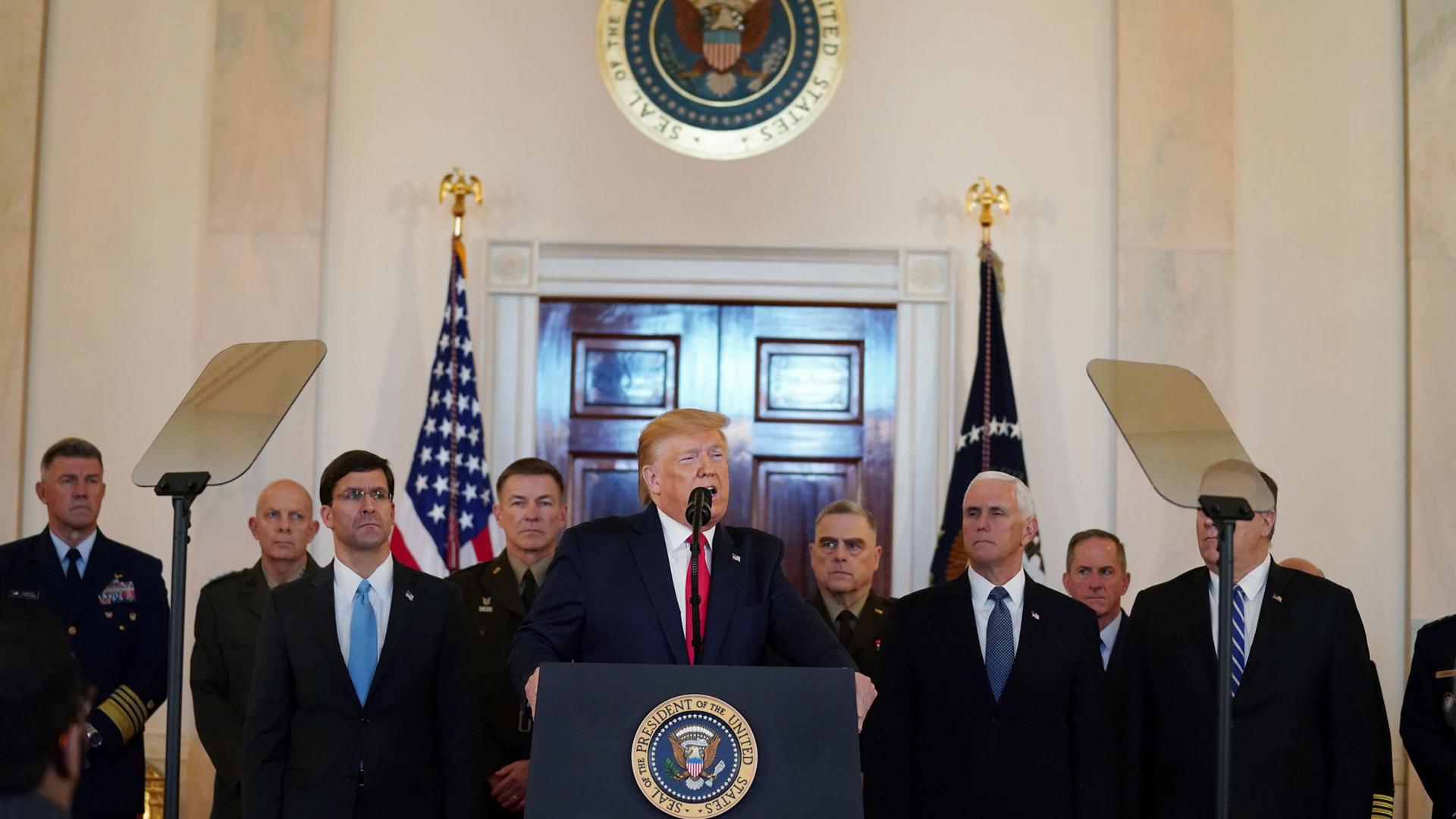Trump says no casualties in Iran attacks, does not want to use more force
US President Donald Trump delivers a statement about Iran flanked by US Secretary of Defense Mark Esper, Vice President Mike Pence and military leaders in the Grand Foyer at the White House, Jan. 8, 2020.
US President Donald Trump said on Wednesday no Americans were harmed in the Jan. 8 Iranian missile attacks on military bases housing US troops in Iraq, and urged world powers to forge a new nuclear deal with Tehran.
Iranian state television said Iran had fired 15 ballistic missiles from its territory at US targets in neighboring Iraq on Wednesday. The targets were al-Asad air base and another facility in Erbil, the Pentagon said.
“No Americans were harmed in last night’s attack by the Iranian regime. We suffered no casualties,” Trump said in a White House address signaling the desire to de-escalate the crisis with Iran.
Timeline: Escalating conflict with Iran — what’s happening?
“Our great American forces are prepared for anything. Iran appears to be standing down, which is a good thing for all parties concerned and a very good thing for the world,” he said.
Trump stopped short of making any direct threat of military action against Iran but announced the US “will immediately impose additional punishing economic sanctions on the Iranian regime” as the US “continues to evaluation options in response to Iranian aggression.”
Trump disparaged the Joint Comprehensive Plan of Action — or Iran nuclear deal signed under the Obama administration. He urged the accord’s other signatories — the UK, France, Germany, Russia and China — to abandon the deal and work toward a new agreement.
“We must all work together toward making a deal with Iran that makes the world a safer and more peaceful place,” he said.
Trump touted his own economic, energy and military leadership and ended his speech with a message to the people and leaders of Iran. “We want you to have a future and a great future. One that you deserve. One of prosperity at home and harmony with the nations of the world. The United States is ready to embrace peace with all who seek it.”
Related: The history of US-Iran relations — A timeline
Trump administration officials are also expected to brief Congress on Wednesday regarding the assassination of top Iranian commander Qasem Soleimani in Baghdad last week. Democrats have pushed for legislation to rein in the president’s ability to launch a war.
Secretary of State Mike Pompeo, Secretary of Defense Mark Esper, Joint Chiefs of Staff Chairman Mark Milley and CIA Director Gina Haspel planned to address the House of Representatives behind closed doors at 1 p.m. EST and the Senate at 2:30 p.m. EST.
Trump broke precedent by failing to inform congressional leaders before ordering last week’s drone strike. He also angered some lawmakers, particularly Democrats, by making classified his formal report to Congress about the strike as he sent more troops to the Middle East. According to the War Powers Act of 1973, Congress must be informed within 48 hours of such an introduction of US forces abroad without a declaration of war or congressional approval.
“This classified War Powers Act notification delivered to Congress raises more questions than it answers. This document prompts serious and urgent questions about the timing, manner and justification of the Administration’s decision to engage in hostilities against Iran,” Pelosi said in a statement. “The highly unusual decision to classify this document in its entirety compounds our many concerns, and suggests that the Congress and the American people are being left in the dark about our national security.”
The Democratic-controlled House may pass legislation this week that would require the removal of US forces from hostilities with Iran within 30 days, unless Congress declares war or authorizes the use of military force.
A similar measure has been introduced in the Senate, which is controlled by Trump’s fellow Republicans who rarely oppose his initiatives, dimming its prospects of passage.
Esper told journalists on Tuesday that Soleimani was planning an attack that threatened US interests, which was to be executed within days rather than weeks. Trump reiterated the immient threat in his Wednesday address, calling Soleimani “the world’s top terrorist.”
Lawmakers have demanded more information, including public testimony, about any threat from Iran and the military’s response. In a letter released on Wednesday, top Senate Democrats asked Esper and Milley for regular briefings and documents about any troop deployments.
And on Tuesday, the Democratic-led House Foreign Affairs Committee called on Pompeo to testify about Iran in public next week.
The strike against Soleimani prompted retaliation by Tehran.
Reuters contributed reporting.
Our coverage reaches millions each week, but only a small fraction of listeners contribute to sustain our program. We still need 224 more people to donate $100 or $10/monthly to unlock our $67,000 match. Will you help us get there today?
